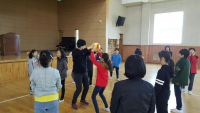
Purpose This study aimed to investigate the psychological capitals created by the experience of winning an Olympic medal by using the photovoice method. Methods Data were collected on the way the participants-five Bronze medalists in the Women's volleyball in 1976 Montreal Olympics-take and send photographs. The interviews were conducted by phone based on the collected data. The photographs were placed into the parent category after conducting inductive content analysis, and their validity was confirmed from the expert meetings. Results The results of the study, indicate that the participants have earned psychological capitals such as my matter volleyball for diligence, the gift of a Bronze medal to gratitude, the source of achievement, challenges, and key of relationship tenderness from the experience of winning an Olympic medal. Conclusion In this regard, this study provides an opportunity to extend the study on the lives of retired athletes who won an Olympic medal to various perspectives, as well as the impact of sports experience on everyday life.










The purpose of this study was to examine psychological capital acquisition through Asian Games Participation. 17 of national women football players were completed Psychological Capitals Questionnair. The psychological capital consists of optimism, psychological skills, self-management, collective efficacy, and performance perception was investigated after the team call-ups and before the team-release. The data was analyzed by paired t-test. As results, Korean women football players’ collective efficient and performance perception showed a statistical significance at the beginning of the team call-ups but optimism, psychological skills, and self-direction did not show statistic significances. The team-harmony, interpersonal-management, team-power, sufficient training, trust in coach, efficient communication, and psychological football factors, which were subfactor of football players’ psychological capital, showed statistical significances. However, confidence, concentration, goal-setting, imagery, willpower, anxiety-control, mental-management, life-management, training-management, innate-behavior management, physical-management, football skills, mediative skills, and football intelligence factors did not have statistic significances. These results demonstrate that effects of mega sporting events-like experiences and psychological factors’ variability and inflexibility according to weather changes should be considered when it comes to discussion of psychological factors regarding players’ performance. It is expected that this study would be a fundamental resource for understanding of psychological influences through participations in mega sporting events and discussions about further psychological interventions for teams with environmental consideration as well as methodological developments which could measure effects of the psychological interventions.
PURPOSE With participants in recreational sports clubs, this study clarified positive psychological capital’s mediating effect on the relationship between exercise commitment and perceived stress. METHODS A survey conducted with individuals actively engaged in recreational sports a yielded data for statistical analysis from 296 respondents. Data processing involved frequency analysis, confirmatory factor analysis, reliability analysis, correlation analysis, structural equation modeling, and testing for mediating effects using the SPSS 29.0 and AMOS 29.0 programs. RESULTS First, results showed that exercise commitment did not significantly impact perceived stress. Second, exercise commitment positively influenced positive psychological capital. Third, positive psychological capital negatively impacted perceived stress. Fourth, positive psychological capital mediated completely between exercise commitment and perceived stress. CONCLUSIONS This research encourages participation in physical activities, especially among those with low physical activity levels, because it positively affects both physical and mental well-being, ultimately enhancing social benefits and overall quality of life.
PURPOSE This study was conducted to estimate the tendency of psychological factors influencing cycling performance by analyzing the characteristic factors of athlete reputation in the news big-data. METHODS To explore the psychological factors influencing cycling performance, an open questionnaire was conducted on 82 cyclists, and Inductive Content Analyses was performed. Overall, 89,520 news articles were collected through BIGKinds, and forming factors of athlete reputation were derived through LDA topic modeling analysis and inductive categorization. Through regression analysis, time series tendency of the factors of athlete reputation was calculated. Finally, the tendency of psychological factors to influence cycling performance was estimated based on the previously derived results in this study. RESULTS The psychological factors influencing cycling performance were found to be; emotion control, trust capital, cognitive control, motivation and communications with the coach. The forming factors of athlete reputation was found to be; reporting of the sports event, infrastructure creation, analysis to performance, moral issue, social environmental changes and sports gossip. The time series tendency of the forming factors of athlete reputation was found to include the categories of Hot, Warm, Cool and Cold. The psychological factors influencing cycling performance are estimated to expand to exercise performance and moral intelligence. CONCLUSIONS The results of this study suggest that the discussion of psychological factors influencing cycling performance extends not only to exercise performance, but also to moral intelligence, reflecting the socio-cultural context in the discussion of performance.